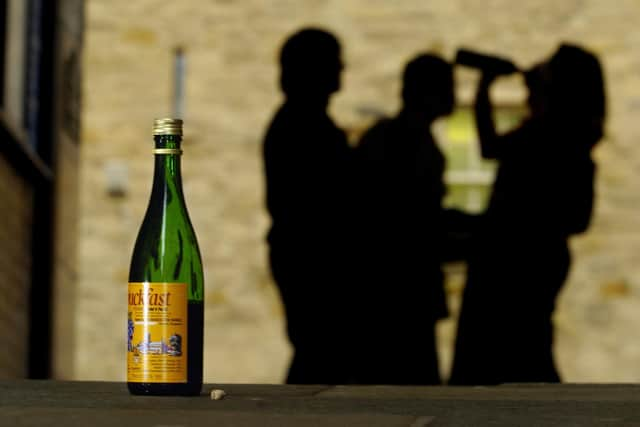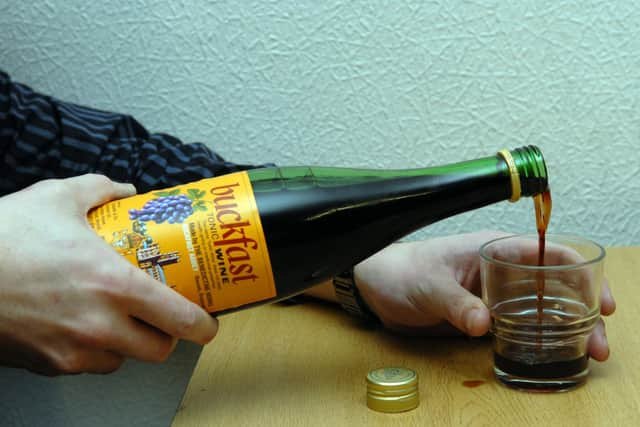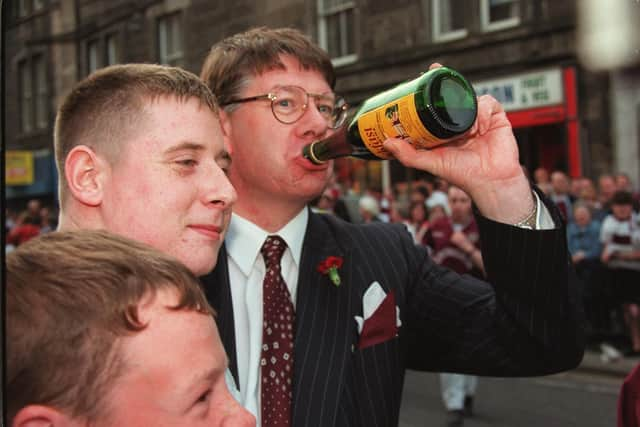The road to Eldorado (and Buckfast): Glasgow’s rocky relationship with tonic wine
and live on Freeview channel 276
Today (May 25) is National Wine Day - and sommeliers both professional and amateur the nation over will be cradling and inspecting their favourite vintage - here in Glasgow we wanted to try a different tack, we wanted to look at Glasgow’s rocky relationship with tonic wine.
Anywhere else in the world the term ‘tonic wine’ might bring to mind medicinal tinctures of fortified wine brewed by holy monks, whereas here in Glasgow the term ‘tonic wine’ is likely to bring to mind flashbacks of nights of drunken debauchery and chaos.
Advertisement
Hide AdAdvertisement
Hide AdThe one brand that comes to mind in any Glaswegian would of course be Buckfast - or Buckie, or wreck-the-hoose juice; or even ‘commotion lotion’ - it’s a fortified wine known by many names, and it is both hated and loved in Scotland in equal measure.
Other brands of tonic wine are avaliable, from the increasingly popular ElDorado to the brand-new King William Fortified Wine, which is proving popular in Northern Ireland - more on that further down.
Why is Buckfast Tonic Wine so controversial in Glasgow?


Buckie; here in Glasgow we know that name all too well - whether it brings a warm smile to your face or an impromptu trip to A&E - Buckfast Tonic Wine is ubiquitous across the city and has been for generations.
Buckfast Tonic Wine has been an ‘orbital news item’ since it began to be linked to anti-social behaviour alongside football hoolaginism in the 70’s- appearing in the news once a year or so with links to its proclivity to cause anti-social behaviour.
Advertisement
Hide AdAdvertisement
Hide AdScientists have linked the drunken effects of red bull mixed with alcohol to the body’s reaction to cocaine. It would only make sense then that Buckfast - which has the same caffeine content as red bull, 30mg - would produce similar effects.
Somehow though, Buckfast has the unparalleled ability to send Glaswegians tonto. Which is surprising given that the Tonic Wine isn’t even that particularly strong, at 15% alcohol content, nor very cheap, costing at least £8 for 75cl.
Competitor to Buckfast ElDorado has seen some renewed popularity in the last few years given its lower price point and the ever-increasing cost-of-living, at around £7 for a 70cl bottle.
Most people know by now that Buckfast Tonic Wine was originally produced by the peaceful Benedictine monks at Buckfast Abbey. An ironic fact that Glaswegians like to show off often - given its violent reputation.


Advertisement
Hide AdAdvertisement
Hide AdElDorado on the other hand is brewed right here in Scotland - marketed and created as a Scottish alternative to the Devon-born Buckfast Tonic Wine.
Buckie enjoys most of its popularity within the so-called ‘Buckfast Triangle’ - Airdrie, Coatbridge, and Bellshill. Mention of Buckfast appeared in 5,638 crime reports in Strathclyde from 2006-2009, which equates to three a day on average.
However, correlation does not equal causation - just because a certain drink is enjoyed by the working class who are most commonly the target of Police intervention, particularly while drunk, does not mean that the drink caused the alleged crime.
Former First Minister, Jack McConnell, a man who has probably never drank Buckie in his life, branded the drink ‘a badge of pride amongst those who are involved in antisocial behaviour’. He’s not wrong, but these types of comments only serve to further the mysticism behind Buckfast Tonic Wine, and further popularise the now-forbidden socially frowned-upon drink.


Advertisement
Hide AdAdvertisement
Hide AdThe more classist critics of the fortified wine might even point to the potential the bottle holds to be used as a weapon as one of the reasons it’s chosen. This theory, while based on the evidence that Buckfast bottles are often used to ‘glass’ or ‘bottle’ people (Buckfast bottles were used as weapons 114 times between 2006-2009), it’s more likely that the bottle is more a weapon of opportunity used in the Buckie-fueled heat of the moment.
Why is Buckfast Tonic so popular around Glasgow and Scotland?


So why is it the drink of choice for folks across Glasgow and the rest of Scotland? A theory posited by the monks themselves claim it’s popularity is a result of its similarity to communion wine - also a mistella - made Catholic’s in Glasgow drawn to the drink in the 70s due to its similarity to communion wine.
Nowadays the average Buckfast enjoyer in Glasgow will not be aware of its catholic connations - but one new tonic wine on the market seems to be marketing itself on the other side of the sectarian divide.
King William Fortified Wine, which used imagery of King Billy of Orange on horseback as if he was leading troops into battle on the bottle alongside showing off it’s alcohol percentage (16.90%) four times on the bottle, which some consumers took to linking to the Battle of the Boyne in 1690, were forced to make changes to the packaging after a consumer complaint about sectarianism was upheld by Watch Dogs.
Advertisement
Hide AdAdvertisement
Hide AdSo like everything in Western Scotland and Northern Ireland, even tonic wine is subject to the identity politics of generationally inherited sectarian consumer choices.
While we can’t completely ignore the Catholicism of Buckfast (it’s brewed by Catholic monks) there are other possible, and more likely explanations.
There’s evidence of Buckfast’s popularity in Glasgow as far back as the 1930’s - in adverts for wine shops in the national newspapers of the time, it’s the only drink wine merchants will mention by name.
In 1921, changes to the licensing laws in Scotland meant you could only buy alcohol between 11:30am to 3pm, and 5.30pm to 10pm on weekdays - and never on Sunday’s, God’s day of worship.
Advertisement
Hide AdAdvertisement
Hide AdBuckfast however, was sold at pharmacies as a medicine, which of course could be bought at anytime due to the tonic wine’s supposed medicinal properties. All the way up until the 1960’s Buckfast was marketed as ‘a splendid pick-me-up that restores zest and sparkle’.


That’s the likeliest possible explanation in our books, and certainly helps us understand the tonic wine’s initial popularity, but how has it sustained such a loyal base of consumers for nearly 100 years?
If you’ve ever drank Buckfast at a party, no doubt someone will try and offer you some explanation to Buckfast’s almost mystical properties. One hair-brained theory claims that the chemicals added to buckfast - sodium glycerophosphate, dipotassium phosphate and disodium phosphate - are behind it, although these are incredibly common food preservatives and often used together.
The truth behind it is, most people trying Buckfast for the first time aren’t drinking it for the taste - you’ll know the unique flavour, somewhere between Calpol and incredibly strong diluent juice - which Buckie aficionados would call an ‘acquired taste’.
Advertisement
Hide AdAdvertisement
Hide AdBuckfast has cemented itself in British culture as a working-class, Glaswegian drink - and this wasn’t done through marketing, nor was it because it tasted a bit like communion wine. In our opinion, it’s more of a self-fulfilling prophecy.
The image of Buckfast is a hard-mans drink - and as the culture in working class Scotland rapidly deindustrialised - many young men had to put on a strong face, while they could no longer properly provide for their family as they were far too old to retrain in alternative trades, they could still demand respect by being the hardest man in the pub.
As the younger generations grew up, they internalise this post-industrial culture, the men they respect and look up to in their community are hard - and they drink Buckfast - therego, they drink Buckfast and can appear like their idols.


This is an internalised process, meaning it’s not done conciously - if you asked just about anyone why they drink Buckfast they’ll say it’s because they enjoy it, and maybe it really is just as simple as that.
Advertisement
Hide AdAdvertisement
Hide AdIn this reporter’s opionion, it’s the mythos and cultural significance in working-class comunities that Buckfast is held to is what keeps people coming back - for the younger generations in and around Glasgow drinking your first swig of Buckfast Tonic Wine is a rite of passage.
Comment Guidelines
National World encourages reader discussion on our stories. User feedback, insights and back-and-forth exchanges add a rich layer of context to reporting. Please review our Community Guidelines before commenting.
